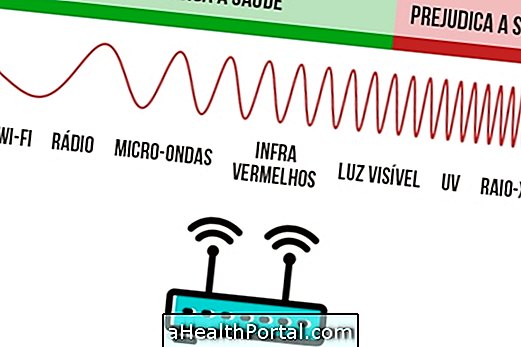Repetitive abortion is defined as the occurrence of three or more consecutive involuntary interruptions of pregnancy before the 22nd week of pregnancy, whose risk of occurring is greater in the first months of pregnancy and increases with advancing age.
There are several causes that may be at the origin of the occurrence of successive abortions, therefore, an assessment of the couple must be made, gynecological and genetic examinations must be carried out, and an assessment of the family and clinical history must be made, in order to understand what is at the root of the problem.
The occurrence of an abortion is a traumatic experience, which can lead to symptoms of depression and anxiety and, therefore, women who suffer from repeated abortions, must also be duly accompanied by a psychologist.
.jpg)
Some of the most frequent causes of recurrent abortions are:
1. Genetic changes
Fetal chromosomal abnormalities are the most common cause of miscarriage before 10 weeks of pregnancy and the likelihood of them occurring increases with maternal age. The most common errors are trisomy, polyploidy and monosomy of the X chromosome.
The cytogenetic analysis test must be performed on the conception products from the third consecutive loss. If this examination reveals anomalies, the karyotype must be analyzed using the peripheral blood of both elements of the couple.
2. Anatomical anomalies
Uterine abnormalities, such as Mullerian malformations, fibroids, polyps and uterine synechiae, can also be associated with recurrent abortion. Learn how to identify changes in the uterus.
All women suffering from recurrent abortion should undergo an examination of the uterine cavity, using pelvic ultrasound with 2D or 3D transvaginal catheter and hysterosalpingography, which can be supplemented with endoscopy.
3. Endocrine or metabolic changes
Some of the endocrine or metabolic changes that may be the cause of recurrent miscarriage are:
- Diabetes: In some cases, women with uncontrolled diabetes have a high risk of fetal loss and malformation. However, if diabetes mellitus is well controlled, it is not considered a risk factor for abortion;
- Thyroid dysfunction: As in the case of diabetes, women with disorders of uncontrolled thyroid function also have an increased risk of suffering from a miscarriage;
- Changes in prolactin: Prolactin is a hormone of great importance for endometrial maturation. Thus, if this hormone is too high or too low, the risk of miscarriage is also increased;
- Polycystic ovary syndrome: Polycystic ovary syndrome has been associated with an increased risk of spontaneous abortion, but it is still unclear which mechanism is involved. Learn how to identify and treat the polycystic ovary;
- Obesity: Obesity is associated with a significant increase in the risk of spontaneous loss of pregnancy in the first trimester;
- Changes in the luteal phase and progesterone deficiency: A functional corpus luteum is essential for successful implantation and for the maintenance of pregnancy in its initial face, due to its important function in the production of progesterone. Thus, changes in the production of this hormone can also lead to the occurrence of a miscarriage.
Find out what the corpus luteum is and what it is related to pregnancy.
4. Thrombophilia
Thrombophilia are diseases that cause changes in blood clotting and that increase the chance of blood clots forming and causing thrombosis, which can prevent the embryo from implanting in the uterus or cause abortions. Generally, thrombophilia is not detected in ordinary blood tests.
Learn how to deal with thrombophilia in pregnancy.
5. Immune causes
During pregnancy, the embryo is considered a foreign body by the mother's organism, which is genetically different. For this, the maternal immune system has to adapt to not reject the embryo. However, in some cases, this does not happen, leading to miscarriages or difficulty in getting pregnant.
There is an exam called cross-match, which searches for the presence of antibodies against paternal lymphocytes in the mother's blood. In order to carry out this examination, blood samples are taken from the father and mother and, in the laboratory, a cross test is carried out between the two, to identify the presence of antibodies.
In addition, alcohol and tobacco consumption may also be associated with recurrent abortion, since they negatively influence pregnancy
Although in most cases the causes of recurrent abortion can be determined, there are situations that remain unexplained.
Was this information helpful?
Yes No
Your opinion is important! Write here how we can improve our text:
Any questions? Click here to be answered.
Email in which you want to receive a reply:
Check the confirmation email we sent you.
Your name:
Reason for visit:
--- Choose your reason --- DiseaseLive betterHelp another personGain knowledge
Are you a health professional?
NoMedicalPharmaceuticalsNurseNutritionistBiomedicalPhysiotherapistBeauticianOther
Bibliography
- CARVALHIDO, Joana Alexandrina E .. RECURRENT ABORTION: NEW APPROACHES. Dissertation | Bibliographic Review Article, 2014. Abel Salazar Institute of Biomedical Sciences.
- IPGO - REPRODUCTION MEDICINE. Repetition abortions. Available in: . Accessed on 14 May 2019


.jpg)





















